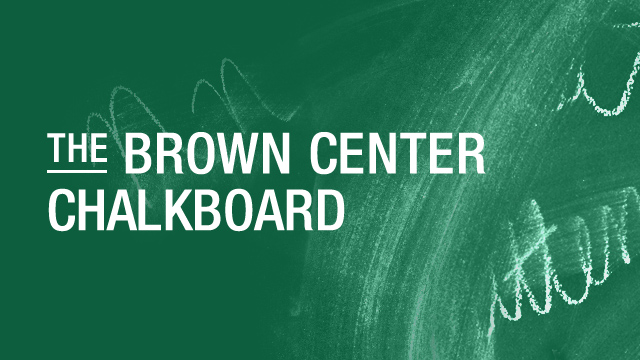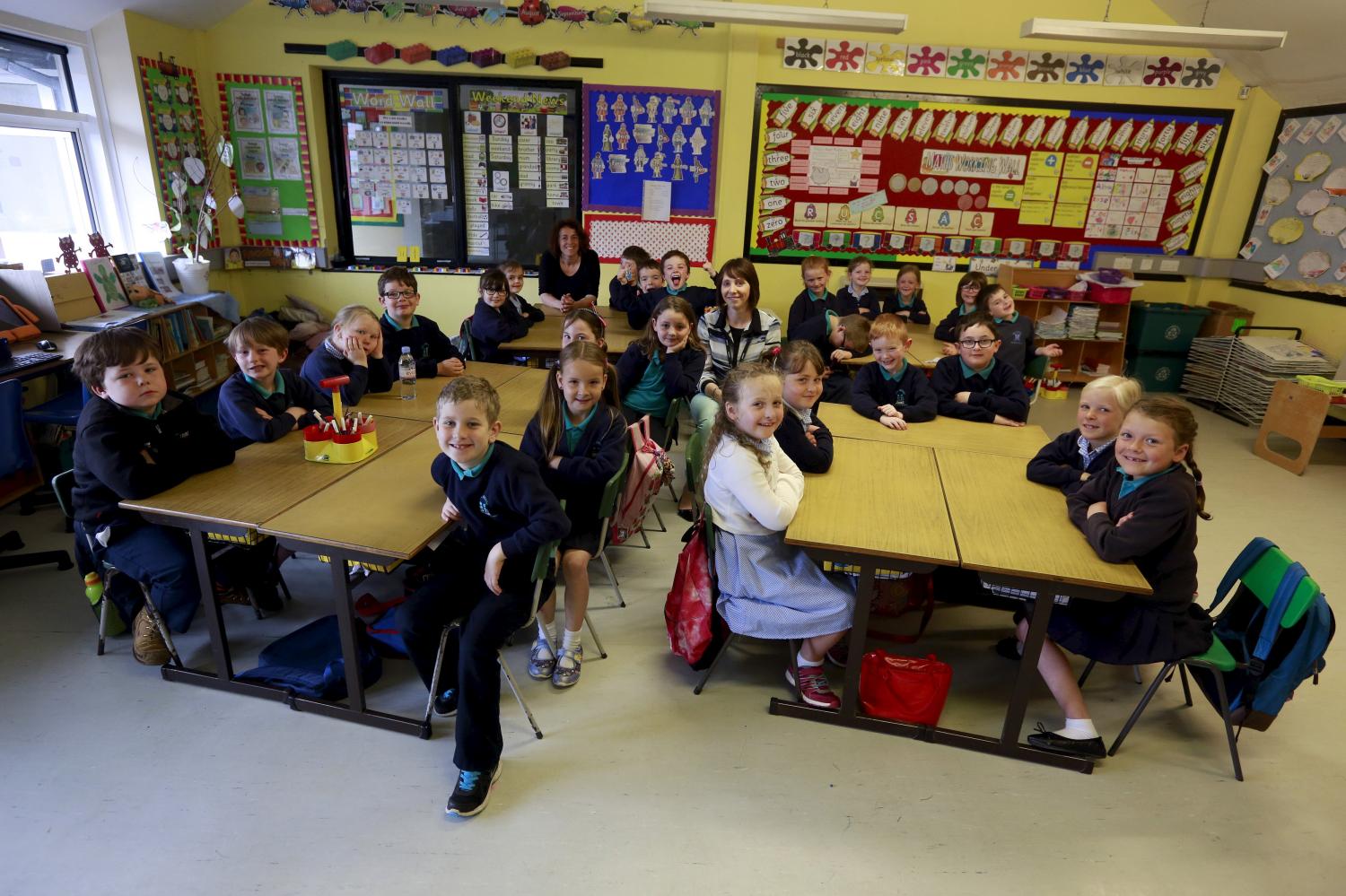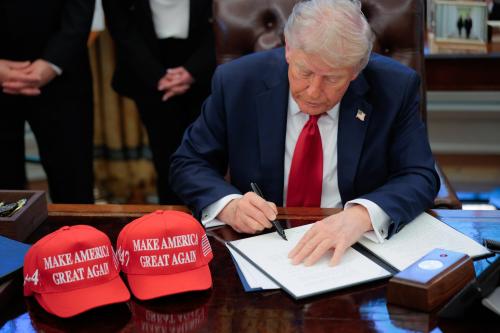For the next two-and-a-half weeks, the Chalkboard will feature special content as part of our series, “Memos to the president on the future of U.S. education policy.” We started this work several months ago, along with four project co-chairs, with the hope of informing broad questions about the appropriate federal role in education policymaking and specific questions of what federal policymakers should do.
We were motivated to undertake this task by last year’s enactment of the Every Student Succeeds Act and the upcoming inauguration of a new president. In this context of a changing federal role in education, we felt that detailed directives promoting effective federal policies would make valuable contributions to vigorous public debate.
Today, we are releasing the first product of that series. The project co-chairs—Douglas Harris, Helen Ladd, Marshall Smith, and Martin West—identified a set of principles to guide the federal government’s role in education policymaking. They present these principles, along with their historical grounding and context, in the new Brown Center report, A Principled Federal Role in PreK-12 Education.
This report on the federal role in education provides a foundation for the next part of the series: 12 policy memos from leading experts with recommendations for federal policymakers. We will release one memo on each business day from Thursday, December 8, through Friday, December 23. Each memo will take an issue facing PK-12 education, describe the current state of the issue (and the state of federal policy on that issue), and present specific policy recommendations to the incoming presidential administration grounded in current research.
We asked the memo writers not to cater their recommendations to a particular candidate, or president, but rather to present what they believe would be sound federal policy in their respective areas based on their knowledge of research on the topic, along with their insights and experiences. We hope these memos will be immediately useful to the Trump administration and the incoming secretary of education. We hope they will also be useful to others who work in education policy, whether at the federal level or not, as well as to subsequent administrations.
Of course, there are far more than 12 important issues in PreK-12 education today, and any series like this is bound to feel incomplete. In choosing which topics to cover, we prioritized issues with an important federal role and the potential for new federal policy during the coming administration. Our focus on the federal role turned us away from some topics—like the Common Core State Standards and charter schools—that rightly receive a great deal of attention but are fundamentally state or local issues. This series does not explicitly focus on topics in higher education, as we will leave that for a subsequent series, although a few memos in this series address issues beyond grade 12.
Our release schedule is as follows (and this page will be updated with links):
| Date | Topic | Authors |
|---|---|---|
| 12/7 | A principled federal role in PreK-12 education | Douglas Harris, Helen Ladd, Marshall Smith, & Martin West |
| 12/8 | K-12 finance | Nora Gordon & Martin West |
| 12/9 | Teachers | Pamela Grossman & Susanna Loeb |
| 12/12 | Support services and children’s comprehensive needs | Mary Walsh & Joan Wasser Gish |
| 12/13 | Career and technical education | Robert Schwartz |
| 12/14 | Special education | Thomas Hehir |
| 12/15 | High school and college graduation | Marshall Smith & Kelli Parmley |
| 12/16 | Data privacy and research | Dan Goldhaber & Aimee Rogstad Guidera |
| 12/19 | Early childhood education | Daphna Bassok, Katherine Magnuson, & Christina Weiland |
| 12/20 | English learners | Kenji Hakuta & Raymond Pecheone |
| 12/21 | Continuous school improvement | Anthony Bryk, Helen Ladd, Jennifer O’Day, & Marshall Smith |
| 12/23 | Educational research and the Institute of Education Sciences | Douglas Harris |
On the afternoon of Wednesday, January 4, we will host a public release event at Brookings (in Washington, DC) to discuss the federal role in PK-12 education. We will provide additional details through the Brown Center newsletter as they become available.
Having spent many days over the past few months talking with—and reading the work of—an extraordinary group of co-chairs and memo authors, we thought we would close with a couple of reflections.
- First, we have been struck by the interconnectedness of these issues. For example, the country’s success in serving students’ comprehensive needs has clear implications for civil rights and students with special needs. Its success in producing high-quality, timely research has immediate implications for policies related to teachers, school finance, and early childhood. Each memo is valuable as a standalone product—and aims to be useful to a reader who reads only that memo—but reading across the Principles report and memos reveals an additional layer of richness and additional set of opportunities.
- Second, we have been heartened to see experts of different political backgrounds find substantive areas of agreement. The co-chair team, in particular, tackled an unambiguously political question—about the appropriate federal role in education—as a group that has advised and served both Democratic and Republican administrations. While months of phone conversations and back-and-forth with document drafts unearthed some policy disagreements, the co-chairs were able to localize those disagreements and find agreement on their core questions. Moreover, in the policy memos, we saw many ideas that were either fundamentally apolitical or had elements that align with both Democratic and Republican principles. This includes, for example, Bob Schwartz’s insightful comments about ESEA’s focus on elementary rather than secondary education (making “ESEA” a misnomer), as well as proposals for child care tax credits as a strategy to improve access to high-quality care. Even in a time of hyper-partisanship, we see opportunities for education policymakers of different political parties to find more than enough agreement to tackle many of the challenges covered in this series.
We hope you will enjoy the series as it unfolds on the Chalkboard and that you will join us in January for the release event.
The Brookings Institution is committed to quality, independence, and impact.
We are supported by a diverse array of funders. In line with our values and policies, each Brookings publication represents the sole views of its author(s).







